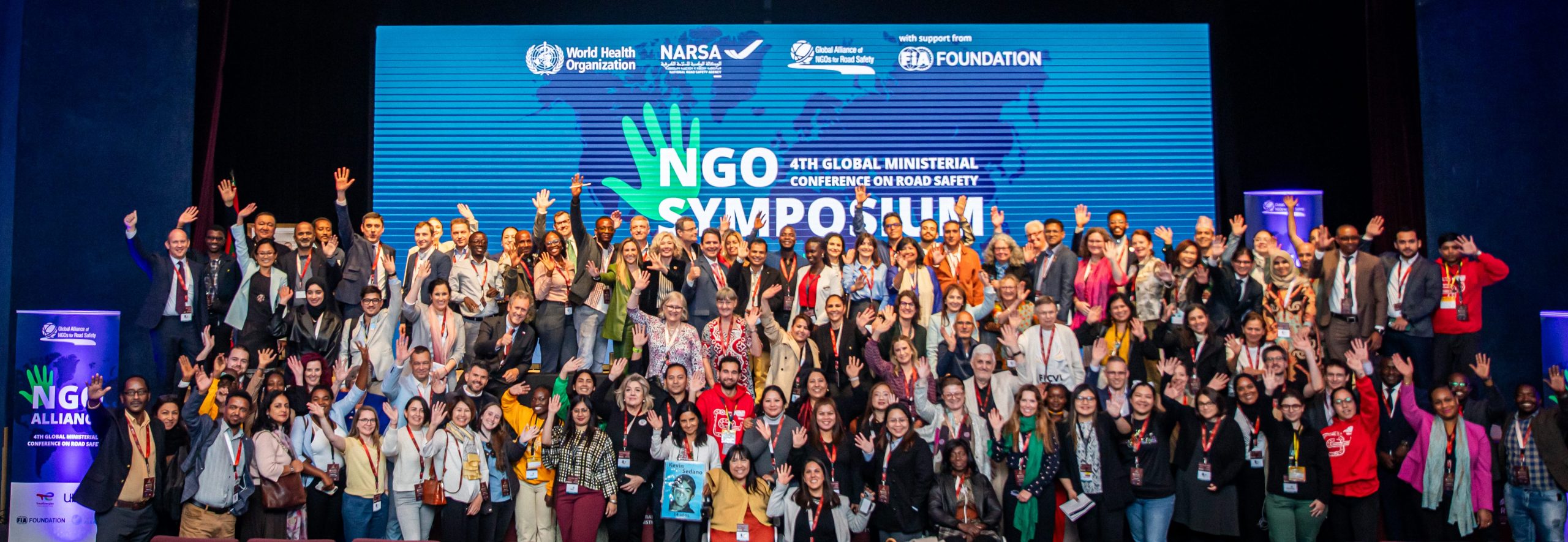
The NGO Symposium organized by the Alliance at the 4th Global Ministerial Conference on Road Safety (Ministerial Conference) in Marrakech demonstrated that moving from commitments to accountability for safer roads require a collaborative approach where government policies, community advocacy, private sector involvement and sustainable financing must converge.
The Symposium, co-hosted with WHO and the Government of Morocco and in partnership with FIA Foundation, convened civil society, youth, global stakeholders, government authorities, and the private sector.
A video message was delivered by Dr. Tedros Adhanom Ghebreyesus, Director-General of the World Health Organization, with keynote speeches from:
Case studies on roles and commitments were presented by:
A panel discussion on roles and commitments was delivered by:
Panelists for the session on financing for road safety included:
The symposium provided actionable insights on bridging the gap between road safety commitments and on-the-ground realities through meaningful, accountable, and life-saving actions. It underscored the need for collaborative strategies for change, sustainable financing, moving towards actionable policy, and the importance of people-centered approaches supported by evidence of what works. Keynote addresses, case studies, and panel discussions highlighted these themes. See the agenda HERE for a list of speakers and panelists.
“NGOs are instrumental to achieving the 2030 Agenda for Sustainable Development. NGOs have your boots on the ground. You witness and document the grim realities on our streets; speak up for road traffic victims and their families; and put forward ideas and strategies to make people safe. You also serve as a bridge from communities to authorities, helping governments articulate and prioritize actions on road safety that benefit everyone,” says Tedros Adhanom Ghebreyesus, Director-General of the World Health Organization.
The keynote addresses at the symposium highlighted the role of NGOs in ensuring accountability, including the following:
In the first session focusing on roles and commitments, two case studies were presented, focusing on NGOs and the private sector. It was highlighted that NGOs should collaborate with other stakeholders in demanding accountability through their advocacy which should also showcase their utility in supporting decision making. This was buttressed by Afef Ben Ghenia, Les Ambassadeurs de la Sécurité Routière, Tunisia who stated that “our 30km/h school zones project in Tunisia involved collaboration with government, local authorities, ministries, and other NGOs. Through this, we have made significant progress across the country and have now evolved from a small NGO into a key actor in decision-making.”
Additionally, it was highlighted that the private sector have roles to play in ensuring accountability within the communities they serve by supporting road safety efforts directly and through collaboration with other stakeholders. According to Jacques-Emmanuel Saulnier, TotalEnergies Foundation, “the private sector has a responsibility to reduce deaths and injuries with their employees and the communities they serve. We are committed to zero fatalities by ensuring safety of our employees on the roads, supporting NGOs advocating for road safety, and getting involved in promoting road safety. For example, we are distributing 1000 safe helmets for free at our service stations in Marrakech.”
The panel discussion also highlighted that multifaceted collaborations integrating government policy, accountability, private sector involvement, and NGO-led community actions can drive comprehensive road safety initiatives. These collaborations are essential to achieving global road safety targets. The discussion summarized some of the roles various stakeholders can play including:
The second panel discussion focused on sustainable financing approaches to support road safety efforts, calling on linkages between road safety and other economic and development initiatives. According to Priti Gautam, Asian Development Bank, “to advance road safety, we must leverage economic assessments that speak to governments’ priorities across diverse regions. By combining road safety with larger transport projects and linking them to climate initiatives, we can unlock concessional loans and open up new financing opportunities for sustainable road safety solutions.”
The session highlighted the need for a multi-sectoral approach to road safety financing and the evolution of traditional funding models. This should include the following:
According to Abdessamad Kayouh, Minister for Transport, Morocco, “Road safety is a human issue, not just a political or technical challenge. Decision-makers must be held accountable to transform high-level commitments into real actions, and our policies should be grounded on the realities of people’s lives.”
Commitments must yield tangible outcomes by shifting from mere discussions to concrete policy implementation and evidence-based actions that protect lives. Government must move beyond policy rhetoric to concrete action, remain accountable, allocate resources by establishing standalone road safety budgets, and integrate road safety into broader national development plans.